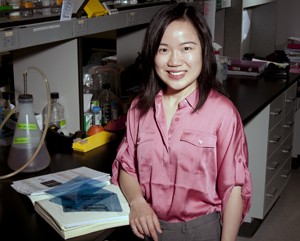
Cong (Lucy) Li, a native of Beijing, China, developed a research philosophy during her six years as a graduate student at Washington University in St. Louis that she has very successfully implemented and enthusiastically infused among her fellow graduate students.
Li, who has a very strong entrepreneurial instinct, believes that scientific research should be considered a loop where research turns value (money or social beliefs) into knowledge and innovation turns knowledge into value. The different parts of the loop should stimulate each other and unite to produce a positive feedback.
“I’m an advocate for innovation and entrepreneurship, especially among graduate students,” says Li, who will receive a doctorate in neurosciences from the Division of Biology and Biomedical Sciences in Arts & Sciences May 18. “My passion is my love of science coupled with the belief that it should be implemented for the good of society.”
Li served as one of two graduate students on the university’s Board of Trustees this past year. She provided student perspective and promoted leadership and entrepreneurial spirit among graduate students.
This past academic year, she also was part of an entrepreneurship team that won a cash prize in the Olin Cup Competition, where, since 1998, winners receive seed money to help grow their innovation. Li and her team came up with a method to create a tattoo through injection via fine needles.
Through some engineering wizardry, the injected dye would find the desired body area and release the design on the skin then dissolve in three months.
Li has proven the concept in live experiments with animals, and credits her research as inspiration for the invention. “I figured that if you can use (needles) to inject DNA or draw blood, you could also use them to inject a substance without significantly damaging tissue,” she says.
At China’s Peking University, she studied biology and became attracted to neuroscience. She said she heard a stirring lecture about brain diseases and traumas and, in subsequent readings, found that neuroscience is considered the last frontier of the biological sciences in which the ultimate challenge is to understand the biological basis of consciousness.
At the beginning, life in St. Louis — nearly 7,000 miles from home — was hard. Li had never spent appreciable time away from family. Within the first week, the rigors of neuroscience classwork and the challenge of adjusting to new academic jargon told her she wasn’t in Beijing anymore. But she quickly bonded with classmates, and the camaraderie established what has become a very large network of good friends and colleagues.
Li has very strong leadership qualities, which have been cultivated with support from the graduate school and deans along the way. She has been involved with a host of impressive projects and activities, including serving as a Kauffman fellow in the Life Sciences Entrepreneurship program; president of the International graduate students association for Career development And Networking, I-CAN and co-vice president of the BioEntrepreneurship Core, in which she continued to link basic science with entrepreneurship.
Li also was project manager and human resources officer for the Biotechnology and Life Science Advising Group, an organization of graduate students and post-docs that offers consulting services to the St. Louis community.
Early in her graduate career, Li and her adviser, Naren Ramanan, PhD, assistant professor of anatomy and neurobiology, discovered a new cellular signaling pathway for learning and memory with implications for both Alzheimer’s disease and bipolar disorder.
For this accomplishment, Li received the O’Leary Award, an honor given by the WUSTL neuroscience community.
“As my first graduate student, Lucy has been terrific to work with,” Ramanan says. “Lucy is inquisitive, meticulous and hard-working. She always maintains her cool even in the face of adversity.”
This summer, Li will begin her career in San Francisco as a consultant with inVentiv Health-Campbell Alliance, a leading pharmaceutical management consulting firm.
“My role is to bridge the gap between science and the pharmaceutical industry, leading to commercialization,” Li says. “My years at Washington University laid the perfect groundwork for this opportunity.”